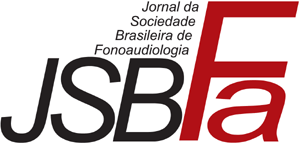PURPOSE: To establish relationships between age at onset of individual hearing aid use, functional hearing, communication skills, family involvement and family expectations regarding language development of children diagnosed with hearing loss during the first three years of life. METHODS: Thirty-five babies diagnosed with moderate to severe hearing loss who were receiving treatment at the Children's Hearing Center/Derdic (CeAC) were evaluated during a period of 24 months. Assessments were carried out every six months and included: VRA - Visual reinforcement audiometry (with and without amplification); IT-MAIS; MUSS; and satisfaction of family regarding child development. RESULTS: Cluster analysis was performed among the subjects. Consistent use of hearing aids was the only variable that exhibited a strong relationship with hearing and language skills. Children whose parents were not satisfied exhibited severe hearing loss and limited auditory capacity even with the use of hearing aid, and, consequently, poor auditory skills and speech production. CONCLUSION: Datalogging monitoring can guide the knowledge of speech-language pathologists and audiologists and it can also be used on strategic planning. Family involvement, quality of parental participation in the intervention program as well as expectations about the future are also important aspects to consider as these can aid therapists and researchers on the assessment of deaf babies intervention effectiveness.
Hearing loss; Hearing aids; Language development; Questionnaires; Rehabilitation of hearing impaired










